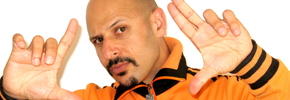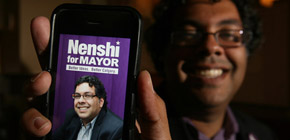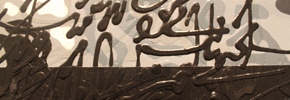Sima Sahar Zerehi – “Come heere baby, come heere baby, come, come onnn . . .”
Croons a fully-grown male voice, and than complete silence.
“Sorry my baby hit the mute button,” chuckles an apologetic Maz Jobrani.
The baby in question is his second child, eleven-month-old daughter Mila who interrupts our conversation occasionally with her baby talk to get her dad’s attention.
To my relief Maz (Maziar) Jobrani is far from being a typical celebrity – despite being a bona fide star – he’s free of all pretention and talks breezily. The Iranian-American comic and actor has clearly not let fame go to his head. In fact, despite residing in Los Angeles and starring in dozens of television shows and films, not to mention the stand up acts, he sounds like a regular minivan dad, albeit one who’s a household name for comedy fans.
The second surprise came when I realized that the real Jobrani wasn’t at all like his on stage persona, there was no self-deprecating humour, no horseplay or tomfoolery, just candid conversation sprinkled with thoughtful insights.
When I asked him if there’s a dark side to his personality he responded, “a lot of comics have that. One of the reasons why a lot of comedians are even on stage is because they’re looking for acceptance. They were nerdy, they were not loved. There are a lot of comics who have a dark side or a lot of issues.”
“For me, I feel privileged to be able to do what I do. I’m not a hundred percent all together guy, I got issues and stuff, but for the most part I don’t go home and shoot heroine or anything.”
Jobrani states that what grounds him is his connection to the broader world, “There are things that remind you of the reality of life. I read the paper a lot, there’s people in war and people suffer, I feel privileged to be able to do what I do.”
At this point Jobrani turns his attention once again to baby Mila, “Baby do I have a dark side?” he teases using his daddy voice followed by a series of inarticulate noises designed to make a baby laugh. As though on cue Mila breaks down in giggles, delighted by her father’s performance.
While Jobrani is a hit with the toddlers he admits that he wasn’t necessarily the funny kid growing up. He notes, “It wasn’t so much that I was funny, it was more that I was a big fan of comedy.”
He recounts, “As a kid I was a big fan of Eddie Murphy, he was hot when I was young. When I got into stand up more I became a fan of Richard Pryor because he talked about social issues. Bill Cosby has always been an inspiration.”
Fans of Jobrani’s work are familiar with his Iranian roots a source of much of his comedy. Born in Tehran, Jobrani and his parents immigrated to San Francisco’s Bay Area when he was six years old.
Like many Iranian-American’s Jobrani’s parents saw his future as a professional in a field such as law, but the comic had other plans.
Jobrani speaks frankly about rejecting a career in law and dropping out of his PhD program at UCLA to pursue his childhood dream of acting. “I think at first they were a little shocked, my mother wanted me to become a lawyer.”
He adds, “I did it in two phases. My first phase was to tell her I wasn’t going to be a lawyer I was going to be a professor so I started a PhD program in political science – even with that she was worried – and then when I dropped out of the PhD program she was really worried. She said at least learn to be a mechanic or something. It’s practical, people will need it and it’ll be a backup. There was a lot of negotiating going on but once they saw I was passionate about it they were supportive.”
Although Jobrani didn’t continue his PhD in political science he continued to rely on politics to inform his work as a comedian.
“I think there’s a great connection between politics and laughter – some of my favorite comedians are political comics like the Daily Show or Richard Pryor – comedy is a good way to talk about serious subjects but do it in a subversive way so people don’t even know you’re talking about a serious subject. That’s the beauty of comedy you can make people laugh. I think one of the jobs of a comedian is to point out hypocrisy in politics, they go hand in hand they’re a good team, they compliment each other a lot,” explains Jobrani.
It was Jobrani’s ability to make light of politics that paved his way to fame via the Axis of Evil comedy tour.
“What happened was Mitzi Shore, Pauly Shore’s mother, who has a comedy club where a lot of big names had performed like David Letterman, Jay leno and Robin William, she’s always been a kind of visionary, so in the year 2000 she thought there was going to be a need for a voice for comedians from the Middle East. So she took me and a couple of other Middle Eastern comedians and she put us together for a show that she would put on once in a while called The Arabian Nights,” reminisces Jobrani.
In the post September 11th era, Mitzi Shore’s vision of the need for a voice for Middle Eastern comedians became an opening for Jobrani and his colleagues to mount a comedy tour poking fun of the Bush era administration and the atmosphere of fear and hostility prevalent in the United States as well as much of the rest of the world during that time.
Jobrani explains how the tour came together, “A few years later me and Ahmad Ahmad who was the Egyptian American and Aaron Kader who was the Palestinian American decided to spin Arabian Nights off into what became the Axis of Evil comedy tour. We felt the timing was right and we wanted to make a statement. With us being categorized as the Axis of Evil we thought that it was a fun way to poke fun of that title by taking it and turning it on it’s head. It went really well. It was the first comedy show ever with all Middle Eastern Americans, it premiered on an American television network, Comedy Central. It was one of the things that helped get us all known in the comedy world and beyond. The tour made a big bang and we got a lot of publicity for it.”
While Jobrani’s work has always been controversial he doesn’t feel that censorship plays a large role in the world of stand up comedy.
“I don’t get heckled very badly in a negative way I don’t get a lot of crazy people at my shows. Once in a while for example during the Bush administration I would have someone in the audience who would speak up and say stupid stuff and you would end up screaming at them and them screaming at you,” asserts Jobrani.
Jobrani explains, “in stand up comedy you are the writer and producer, you’re everything , the club owner may come out and say don’t say that, people walked out, but for the most part it’s your choice to say and do whatever you want.”
“I think as a comedian you live and die by what you say on stage,” Jobrani adds. “The main thing is that you have to be funny. Sometimes comics want to be edgy and say something on stage, you can’t just be edgy to be edgy and to offend, if people aren’t laughing you chose to go somewhere and not get rewarded for it.”
Jobrani confides, “I think one of the jobs of the comedian is to make fun but I never make fun of the underdog. I never make fun of somebody with a handicap or anything like that. I think that’s not something good to do.”
“Sometimes when I’m on stage I’ll play with different racial stereotypes but I don’t do it in a mean way I do it in a let’s all laugh together kind of way. I’ll do some self deprecating stuff and go from there to some racial stereotype style but I don’t do it to be offensive,” notes Jobrani.
Playing with stereotypes, particularly the iconic Iranian-American or Middle Easterner is one of Jobrani’s trademarks. When I asked him if stereotypes actually get challenged or cemented in comedy he responds:
“You make fun of the stereotypes but there’s some truth to every stereotype. People realize you can’t take them too seriously. At the same time in making fun of them you’re break them down somewhat – for example if you say Middle Easterners we’re all suppose to be terrorists – in a room of the comedy show we’re all laughing because there’s not a single terrorist here, there’s doctors, there’s engineers, there’s people that are successful, and people see that, and go, oh that stereotype is not true.”
Jobrani points out, “It’s interesting if you take the population of people who are actually terrorists in the Middle East and you compare it to the actual population of the Middle East it’s so miniscule and yet we’re known for that – so that’s part of having people come out and laugh in a show.”
Jobrani interjects, “speaking about stereotypes, at a show in Pasadena I did a joke about how Iranians are buying out half of Los Angeles and how we love to buy buildings. Towards the end of the show this Persian Armenian lady in all seriousness yelled out: ‘let’s buy the club’ – I said excuse me? She said ‘we should buy this club’ this lady was doing the math and thought this was a good investment.”
Speaking about his audiences Jobrani states, “I try to have my audiences be mixed so that they experience laughter with people from the Middle East so they think my stereotypes are not all true.”
“My audience – for the most part is made up of a good amount of Iranians – Iranians have been very supportive which has been great, a good number of Arabs – I’ve done shows in a lot of Arab countries. You also get middle Americans, it’s expanding but I would say 60% of my audience are still Middle Easterners,” enumerates Jobrani.
While Jobrani admits that his audience is predominantly composed of people from the Middle East, he believes that it’s a person’s worldview rather than their heritage that connects them to his work.
“I think that if they have a worldly view, if they watch the news and stuff they can understand my work. I try not be exclusive, I don’t do any material in Farsi because I don’t want to be exclusive and also because I’ve grown up in America, the rhythm of my jokes are all in English,” divulges Jobrani.
He continues, “if you do a show in California versus a show in New York some of the references are going to be different. You have to explain a little bit more in the setup. For example if I do a show for a benefit with all Iranians and I want to make a joke about Iranian mom’s I don’t have to do a setup but if I’m doing a show in New York where the audience is more mixed I may say Iranian mothers are like Jewish or Italian mothers as a setup. It’s just learning how to stage a joke so that others can get it.”
Jobrani is humble when speaking about his expansive career, which ranges from dramatic roles in films like The Interpreter alongside Nicole Kidman and Sean Penn, to characters in comedic television shows such as Better Off Ted, to appearances in TV dramas like The West Wing and ۲۴, to his most recent roles starring on FOX’s Traffic Light and NBC’s Perfect Couples.
He observes, “I’ve always said comedians are like entrepreneurs we’re working on a lot of stuff. I’ve been working on a movie for a few years it’s called Jimmy Vestvood: Amerikan Hero (www.jimmyvestvood.com). I recently did a pilot episode of a web show that’s available on my YouTube channel of Go Home Arab (http://www.youtube.com/watch?v=5wDqmdRl4yk). I want to do a whole series around that. I continue to tour, continue the Minivan Men: A weekly podcast for regular people with children (http://www.minivanmen.com/MVM/Home.html). I’m auditioning for different movies – last year I was in a film called David (david-themovie.com) – I played this imam who’s the dad of a Muslim kid who befriends a Jewish kid. The typecasting that’s come for me is all Middle Eastern roles but I’ve tried to resist that.”
Offering advice to young people interested in a career in acting Jobrani states, “I always tell people if you want to get into this stuff get into a theatre program, get on stage. A lot of times people say I want to be an actor but underneath it they don’t want to do the work. They’re just saying they want to be famous. If you do that stuff you get a chance to build your muscles as an actor and to get prepared and when roles come whether they’re comedic or dramatic you’re prepared.”
Jobrani wraps up the interview by mentioning the names of a number of Iranian comedians to watch out for.
He notes, “There’s a handful of Iranian comics that are coming up now: Omid Djalili, he’s been doing it longer than I have, a bunch of guys in L.A., Amir K (www.amircomedy.com), this guy K-von (www.k-voncomedy.com), there’s Max Amini (maxamini.com), in Vancouver there’s Reza Peyk (www.rezapeyk.com), and there’s a guy out here Peter the Persian, as well as a guy in DC called Tehran Ghasri ‘SoParvaz’(www.iamtehran.com).”
At this point Mila is impatiently vying for her dad’s attention so I reluctantly wrap up the interview feeling like I’m leaving from a visit at a family friend’s house.
Having chatted with Jobrani I’m even more eager to see him perform in Toronto, trying to reconcile the contemplative man I just spoke to, with the vivacious comedian I’ve seen perform.
On January 14th Jobrani will be performing in the GTA at Le Parc. The show is a gala event raising money for Parya Trillium Foundation’s various programs and services and will include a performance by the band Abjeez and appearances by Jian Ghomeshi the host of CBC radio program Q, as well as academic Ramin jahanbegloo. For more information go to parya.org






Maz Jobrani is an extremely intelligent man, don’t let the comedy fool you. He is hysterically funny, our family has seen him 4 times live and will go again whenever he is in town. But he is also so clever, his observations of American/Iranian life are spot on which is why he is so funny. We have also seen the other comedians he mentions. All excellent guys. Watch for Amir K. This guy is on the same level as Maz.
There’s nothing more heart-warming than knowing that one of your favourite comedians is so grounded! Brilliant :) Wishing Maz all the luck for his upcoming projects, and much love from the audience!!
Very good interview. I also had the privilege to interview him a year ago – http://www.thestandupcenter.com/Blog/MazJobrani.aspx.